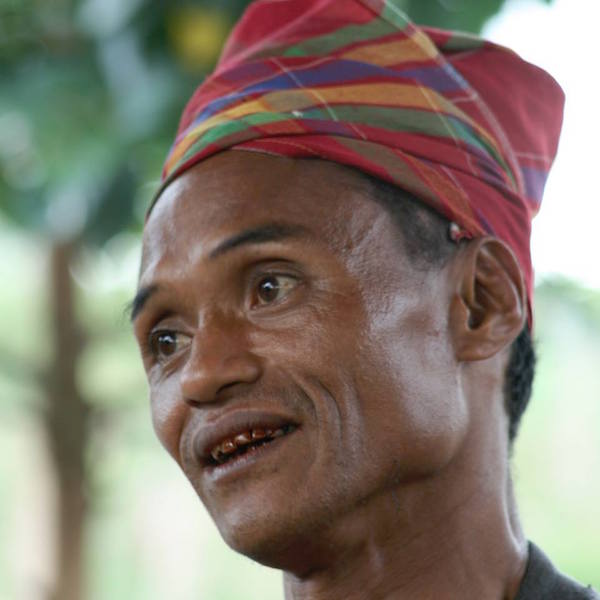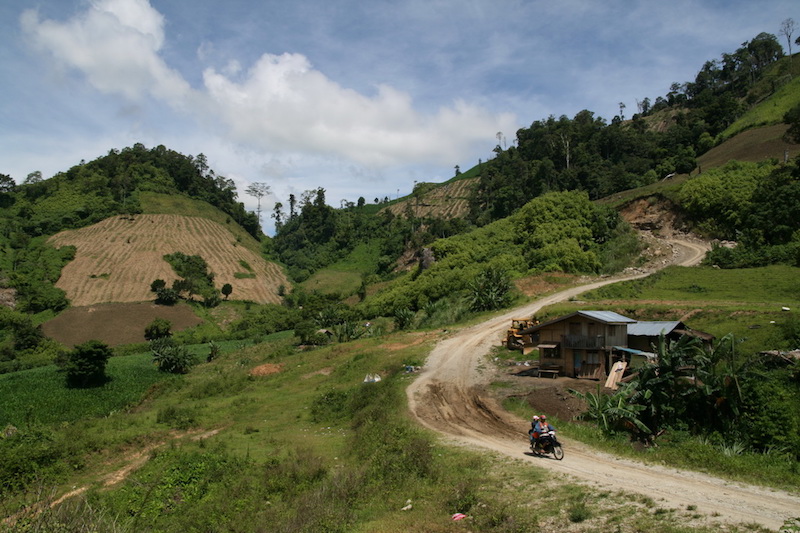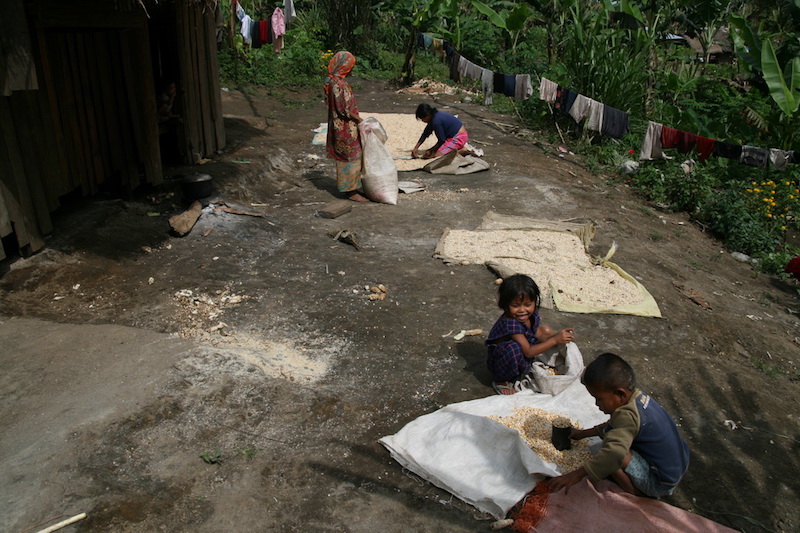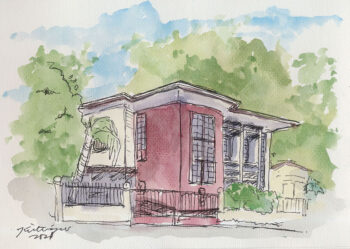Deep into the rugged terrain of Daguma Mountain Range, voices of the struggling Lumads remain unheard even after the death of Datu Victor Danyan, his sons and other Lumads on December 3, 2017.
For 25 years, Datu Victor and his people belonging to the T’boli–Manubo Sdaf Claimants Organization (TAMASCO) endured the agony of being pushed to the fringes due to the encroachment of the coffee plantation in their ancestral domain.
Since the entry of the coffee plantation in the area, Datu Victor and the Lumads in the area have been opposing its expansion.

Harassment and intimidation have been a part of their daily life. But Datu Victor and his people never backed down. Instead, Datu Victor rallied his people to remain firm in their stand.
The village, Sitio Datal Bonlangon, is nestled at the mountain range that straddles the provinces of South Cotabato and Sultan Kudarat. Sitio Datal Bonlangon is part of Barangay Ned, a proclaimed resettlement area in Lake Sebu, South Cotabato.
It can be accessed through the towns of Sto. Nino, also in South Cotabato, and Bagumbayan in Sultan Kudarat. In the past, it took about three hours of grueling motorcycle ride before reaching Datal Bonlangon. Recently, four-wheel drive vehicles can already access the area.
Inevitable death
Given his firm stance and determination to take back their ancestral land, Datu Victor’s death was inevitable. It was just a question of how and when.
The military claims that Datu Victor, his two of his sons and son-in-law were ‘caught in a crossfire’ during an encounter with the suspected NPA rebels. Other reports accused Datu Victor as among those’ NPAs killed in the clash. But Lumads’ rights advocates disputed the allegation.
The incident was not just a simple ‘clash’ because the government forces had a chance encounter with the rebels. It’s something that concerned government agencies like the Commission on Human Rights (CHR) and the National Commission on Indigenous Peoples (NCIP) should dig deeper.

This isn’t just an ordinary case of land conflict. The root cause of this incident is the struggle of the indigenous peoples to reclaim what is rightfully due to them. And knowing who Datu Victor and his people were up against, it’s like a fight between David and Goliath.
The entry of the coffee plantation polarized the Lumads in the area because some saw the entry as an economic opportunity. Thus, some Lumads worked in the plantation as laborers and some had become company guards.
But Datu Victor and his people in TAMASCO remained firm in their stance and admitted that they were ‘hurt’ by the government’s inaction to their pleas.
In 2010, a Legal Rights Center (LRC) story posted in InsideMindanao.com quoted him as saying: “For 18 years, we have been respectful of various government programs like appropriating our ancestral lands into an Agrarian Reform area despite our objection.”
He further said: “We accepted DAR’s (Department of Agrarian Reform) program in order for us to acquire a tenurial instrument just so we may have peace in our ancestral territories. But the government through its agencies, the DENR (Department of Environment and Natural Resources) and NCIP, has allowed Consunji to incessantly intrude in our lands.”
Barangay Ned was proclaimed as a Resettlement Area under the Department of Agrarian Reform DAR already issued Certificates of Land Ownership Awards (CLOAs) to some families in Datal Bonlangan.
In the early 1990s, the agency was supposed to award additional CLOAs but was stalled because the Dawang Coffee Plantation management reportedly opposed it.
Who owns the coffee plantation?
The Dawang Coffee Plantation used to be a part of the logging concession of the Sarmiento Industries covering the towns of Kalamasig, Bagumbayan, Isulan, Palimbang, all in Sultan Kudarat, and in the municipality of Maitum, Sarangani.
The logging concession was then covered by the Industrial Tree Plantation Lease Agreement (ITPLA) No. 238 until June 1991. A year later, the ITPLA No. 238 was converted into the Industrial Forest Plantation Management Agreement (IFMA) 022 and awarded to Silvicultural Industries Inc. (SII), which is owned by the Consunji company.

The total area leased to the company is 11,862 hectares but the lease expired on December 31, 2016. Sources revealed that IFMA 022 was not renewed. Instead, it was reportedly ‘merged’ with the other IFMAs of the Consunjis in Sultan Kudarat Province.
Sources from the ground disclosed that some Lumads, who also have ancestral domain claims in the area, had granted consent to the company for the supposed renewal of the IFMA 22 sometime in 2015.
But Datu Victor and TAMASCO said ‘no’ during the consultation for the Free Prior and Inform Consent (FPIC), which was one of the requirements for the renewal of IFMA 22.
Reclaiming the ancestral domain
In 1991, the Lumads in Sitio Datal Bonlangon were forced to flee their village due to alleged harassments and threats by the company guards.
An LRC briefing paper noted that the Lumads sought refuge in Sitio Blugsanay, which is just a two-hour walk from Datal Bonlangon during the day. That time though, it took them eight hours to reach the village on the night of their evacuation. It was raining heavily and two children and an old man died along the way due to cold and hunger.
Seven years later, the T’bolis started to return to Sitio Bonlangon and slowly rebuilt their community. But threats and harassments by company guards reportedly continued.
In my brief stint with LRC about 10 years ago, I repeatedly heard Datu Victor say that he would never leave his people and he is prepared to defend their ancestral domain even if it would cost him his life.
But this did not mean that he would take up arms against the government nor against the company.
Instead, Datu Victor and his people opted for legal and peaceful means to stop the coffee plantation expansion and even demanded the cancellation of IFMA 22.
They sought help from concerned government agencies but all of their efforts seem to have fallen on deaf ears.
Aside from LRC, the Oblates of Notre Dame-Hessed Foundation has the most notable contribution to the efforts of TAMASCO.
For over 20 years, Sr. Susan Bolanio and her staff tirelessly provided technical and financial support to the Lumads to survive the growing threat of the coffee plantation.
“It’s painful for one who has journeyed with Datu for more than two decades,” Sister Susan posted on Facebook.
Datu Victor never dreamed of reclaiming the entire barangay of Ned, even as the Lumads own the entire village since time immemorial.
TAMASCO’s claim was only at least 300 hectares, the ancestral domain application was approved by the NCIP en banc on October 3, 2013 with title number CADT R12-SUR-1013-163.
The awarding of CADT gave TAMASCO all the legal rights and claim over the land encroached by the Consunji’s IFMA 022 and the Coal Operating Contracts (COC), which were then explored by Daguma Minerals Inc. (DAMI). But in 2010, the San Miguel Corporation bought DAMI mining concession.
‘Thorn’
During the elementary days of his sons Victor Jr. and Artemio sometime in 2006 to 2007, both had to wake up at 3am to boil camote or banana as their baon in school.
Even as it’s still dark, they had to leave their house to endure a two-hour hike on a muddy trail that slices through the rolling terrain before they could reach their school.
There’s a nearby school in Datal Bonlangon, about 30 minutes away by foot, but as a matter of principle, Datu Victor never allowed his kids to enroll in the nearby school. That’s because it pains him to see his kids set foot on a trail that cuts through the coffee plantation.
It may sound so simple and it might have been difficult for him as a father to see his sons endure a two-hour difficult walk to school everyday, but Datu Victor, as a matter of principle, stood his ground and never swallowed his pride. Ancestral domains are sacred among the Lumads.
The issue in Ned even got complicated with the entry of the coal mining exploration in 2006. So what’s left for the Lumads?
Amidst these development aggressions that led to the disenfranchisement of the Lumads from their own ancestral domains, we could barely hear their voices. It seems that their voices have been literally buried deep behind the gigantic mountains.
Datu Victor was like a thorn in the coffee plantation. He was killed because of his firm stance to protect their ancestral domain. But he did not die in vain for he was not only fighting for the future of his children but for the future of his people as well, and perhaps his death will inspire and strengthen them more to continue defending their ancestral domain.
(MindaViews is the opinion section of MindaNews. Reposted with permission from Keith Bacongco’s blog www.bacongco.com. Bacongco used to be Campaigns Paralegal of Legal Rights Center from May 2006 to August 2008)







